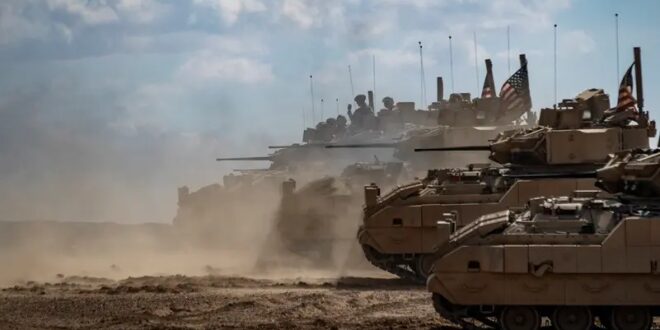The Pentagon chief, the top US military general, and the top US diplomat all spoke to their Turkish counterparts this week
Shortly after the fall of the Assad regime in Syria, the US military conducted one of its largest attacks on ISIS in years. Part of the reason for the timing and ability to strike over 75 ISIS targets with B-52 bombers, F-15s and A-10s was because Russia’s military – invited to Syria to prop up the now-deposed Bashar al-Assad – was sent packing. Israel and Turkey, both with strategic interests in Syria, also took swift military action.
Israel bombed large swathes of the country, including weapons manufacturing sites, Syrian jets and naval assets, and chemical weapons sites. The US did not object to Israel’s operations nor its takeover of a security buffer zone in the occupied Golan Heights.
For all the latest headlines, follow our Google News channel online or via the app.
However, Turkey’s attacks on Syrian Democratic Forces (SDF) fighters in Manbij and northern Syria quickly raised concerns in Washington, particularly at the Pentagon. Earlier this week, officials said the SDF accidentally shot down an American MQ-9 Reaper drone after mistaking it for a Turkish drone.
“We will see how this plays out over the next 48 hours. But we’re not going to tolerate this again,” a US official, speaking on condition of anonymity because they were not authorized to talk to the media, told Al Arabiya English, referring to Turkish attacks on the SDF.
The US and Turkey have had prior disputes over the targeting of SDF fighters. In December 2022, CIA Director Bill Burns reportedly warned his Turkish counterpart that Ankara’s airstrikes in Syria were endangering US forces. In October 2023, an American F-16 shot down a Turkish drone that had entered a US-restricted zone less than half a kilometer from US troops. The US has repeatedly warned Turkey about the risks of flying drones near US personnel.
The Kurdistan Workers Party (PKK) is designated by the US as a terrorist group, but the US-backed SDF is not. Ankara has been irked by Washington’s continued support for the SDF, which has been a critical ally in the fight against ISIS. With around 900 American troops stationed in Syria, US and SDF forces have partnered over the years to carry out joint raids against ISIS targets and militants.
The US views this partnership with the SDF as vital. This was underscored when Gen. Erik Kurilla, the top US general for the Middle East, visited several bases in Syria on Tuesday to meet with US troops and SDF members. He later traveled to Iraq, emphasizing the US’s commitment to defeating ISIS and securing its partners in the region, including Iraq, Jordan, Lebanon, and Israel.
After the Dec. 8 strikes on ISIS targets, Kurilla said “there should be no doubt” that the US would not allow ISIS to take advantage of the situation in Syria. “All organizations in Syria should know that we will hold them accountable if they partner with or support ISIS in any way,” he said.
The recent attacks on SDF positions inside Syria are now worrying US officials again.
In response, Secretary of State Antony Blinken will travel to Ankara this week for talks on Syria. Officials familiar with his travel plans told Al Arabiya English the main focus of his discussions will be a potential deal between Turkey and the SDF.
Late Tuesday, the SDF said it had reached a ceasefire deal brokered by the US with fighters backed by Turkey in Manbij.
Blinken and Pentagon chief Lloyd Austin spoke separately to their Turkish counterparts on Monday. Both US officials stressed the need to continue the Global Coalition to Defeat ISIS (D-ISIS) mission in Syria, an indirect way of saying Turkey should ensure that their military operations do not threaten US troops or their mission.
Austin acknowledged Turkey’s “legitimate security concerns” while also stressing the need to “avoid any risk to US forces and partners, and the Defeat-ISIS Mission.”
Chairman of the Joint Chiefs of Staff Gen. CQ Brown spoke with his Turkish counterpart on Tuesday about the evolving security situation in Syria and US commitment to defense cooperation with Ankara. “Both leaders agreed on the necessity of communication and partner cooperation to ensure a peaceful transition in Syria,” according to a readout of the call. “Turkey is a key NATO ally, and the US values its strategic bilateral relationship,” Joint Staff Spokesman Jereal Dorsey said.
 Eurasia Press & News
Eurasia Press & News




